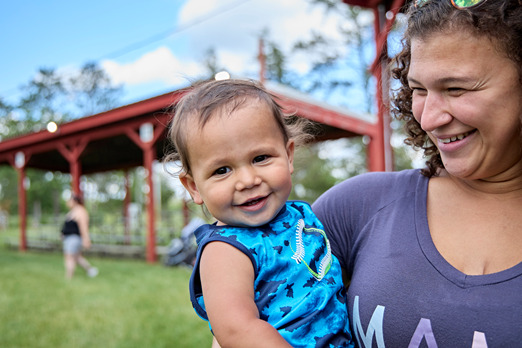This blog was originally published on No Kid Hungry.
Family Spirit Nurture is a home visiting curriculum designed for and with Native American families. The lessons are proven to promote healthy infant feeding and growth in the first year of life and reduce early childhood obesity risk. With support from No Kid Hungry, the Family Spirit team at the Johns Hopkins Center for Indigenous Health is making Family Spirit Nurture resources widely available for community-based health educators as well as for families.
Susan Ninham is a former middle school and early childhood center principal who is a child health advocate in the Red Lake Nation of northwestern Minnesota. Ms. Ninham, who goes by the Ojibwe name Ozaawaanakwadok, recalls a career epiphany when she began working with preschoolers.
“I realized I want to be in prevention—teaching knowledge and skills at a young age so people grow into being healthier holistically,” she said.
Ms. Ninham, a grandmother and auntie to many in her community of some 10,000 people, serves as a health educator with the Red Lake Comprehensive Health Services, where she provides lessons from a curriculum called Family Spirit Nurture to improve healthy infant feeding and growth in the first year of life. Thanks to a generous grant from No Kid Hungry, the curriculum is now used by health educators in 48 communities across 13 states. A new online training program will facilitate sharing the program with many more health educators to reach thousands more Native American families.
The highly visual and interactive curriculum applies public health teaching about responsive and complementary feeding practices while integrating cultural teachings related to infant feeding and nutrition.
“When we ate these Indigenous foods—wild rice, berries, nuts, fish, and wild game—we did not experience diabetes or obesity,” said Ms. Ninham. “Nowadays, children across the U.S. eat too many empty calories and drink sugar-sweetened beverages. Our Native families suffer more with a lack of access to fresh, nutritious foods.”
Developed by Southwestern tribal community members and the Johns Hopkins Center for Indigenous Health, Family Spirit Nurture interrupts the cycle by supporting and celebrating a practice of healthy infant feeding and caregiver well-being.
Using the six-lesson program, Ms. Ninham and dozens of other home visitors across the U.S. teach parents how to know when infants are hungry or full and when to start solid foods. They help parents understand how to be a healthy eating role model and plan meals. Lessons also focus on sugar moderation—avoiding soda and juices—and healthy eating for the whole family. Family Spirit Nurture was proven in a randomized clinical trial to promote healthy infant feeding and growth in the first year of life and reduce early childhood obesity risk.
Based on demand, the Family Spirit team is making the resources and learnings from Family Spirit Nurture available to health educators as well as families. People can get involved in several ways:
For health educators and their community programs:
- Purchase the Family Spirit curriculum for use with families. Health educator training is required through the Coursera learning platform. Ongoing support and personalized feedback is provided. Contact familyspiritnurture@jhu.edu for more information.
For caregivers and families:
- Subscribe to the Family Spirit Nurture Text Messaging service, designed for expecting parents and caregivers of infants up to 18 months old. The free service (data rates may apply, depending on phone service) provides supportive messages and resources about baby’s nutrition, growth, as well as caregiver wellbeing. Parents, grandparents, caregivers, or anyone interested can learn more and sign up at www.FSNmessages.org or text SIGNUP to 413-477-5536
For all:
- Encourage friends and family with new infants to sign up for the Family Spirit Nurture Text Messaging program by sharing postcards, posters or social media messages from this toolkit.
- Learn key nutritional health teaching points by taking a basic Family Spirit Nurture course from Coursera.
“The most important thing is that we can collaborate to understand the importance of that prevention effort,” said Ms. Ninham. “My vision for our community is that we have these babies growing up healthy overall, mentally, emotionally, spiritually, physically, that they’re going to love living healthy lives.”
